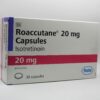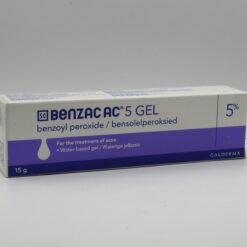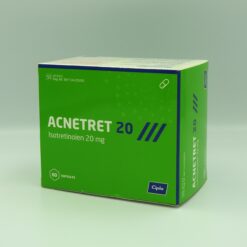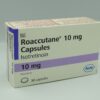Roaccutane (10mg capsule x 30)
$76.60
Roaccutane is a medication available in capsule form that contains 10mg of the active ingredient isotretinoin. It is primarily prescribed for the treatment of severe acne that has not responded to other treatments. Isotretinoin works by reducing the production of sebum, which helps to prevent the formation of acne. This medication is typically taken once or twice a day with food, as directed by a healthcare professional. It is important to follow the prescribed dosage and duration of treatment, as well as any additional instructions provided by the healthcare professional, due to the potential for side effects and the need for regular monitoring during therapy.
Roaccutane, also known as isotretinoin, is a medication primarily used for the treatment of severe acne that has not responded to other treatments. It is a potent oral retinoid that works by reducing the production of sebum (skin oil) and preventing the formation of acne-causing bacteria. Here is a detailed description of Roaccutane, including dosage and usage information:
Dosage:
The dosage of Roaccutane (isotretinoin) may vary depending on the individual’s condition and response to treatment. The typical starting dose is 0.5 to 1 mg per kilogram of body weight per day, divided into two doses. This means that a person weighing 70 kilograms (154 pounds) would start with a daily dose of 35 to 70 mg, usually divided into two 10mg capsules taken in the morning and evening.
The dosage may be adjusted by the healthcare provider based on the person’s response to treatment and the severity of side effects. In some cases, the dose may be increased gradually to a maximum of 2 mg per kilogram of body weight per day.
Usage:
Roaccutane is usually taken with a meal to enhance absorption. The capsules should be swallowed whole and not crushed or chewed. It is important to follow the instructions provided by the healthcare provider and the medication’s package insert.
The treatment duration with Roaccutane can vary, but it is typically around 15 to 20 weeks. In some cases, a longer treatment period may be required. It is important to complete the full course of treatment as prescribed, even if acne symptoms improve before the treatment is finished. This helps to maximize the chances of long-term remission.
Before starting Roaccutane, it is essential to discuss any medical conditions, medications, or supplements with the healthcare provider. Roaccutane can have significant side effects and is contraindicated in certain situations, such as pregnancy and breastfeeding, as it can cause severe birth defects.
During the course of treatment, regular check-ups and blood tests may be required to monitor for potential side effects, such as elevated liver enzymes and lipid levels. Additionally, effective contraception is necessary for females of childbearing potential due to the high risk of birth defects.
Roaccutane should only be used under the supervision of a healthcare provider experienced in prescribing the medication, as it requires careful monitoring and management of potential side effects.
In summary, Roaccutane (isotretinoin) is a powerful medication used to treat severe acne. It is taken orally in capsule form and the dosage is determined based on body weight. Strict adherence to the prescribed dosage and duration of treatment is crucial, along with regular monitoring for potential side effects.
| Weight | 0.06 kg |
|---|---|
| Dimensions | 3 × 3 × 1 cm |
Related products
Benzac AC 5% Gel is a topical medication used for the treatment of acne. The active ingredient in this gel is benzoyl peroxide, which has antibacterial and anti-inflammatory properties. When applied to the skin, Benzac AC 5% Gel helps to reduce the number of acne-causing bacteria and unclogs pores, preventing the formation of new acne lesions. It is typically applied once or twice daily to the affected areas after cleansing the skin. It is important to follow the instructions provided by the healthcare professional or the product label for the safe and effective use of this medication. Common side effects may include dryness, redness, and peeling of the skin. If any severe or persistent side effects occur, it is advised to consult a healthcare professional.
Acnetret (20mg capsule) is a medication that contains the active ingredient isotretinoin and is commonly used to treat severe, nodular acne that has not responded to other treatments. The recommended dosage and duration of treatment may vary depending on the individual's weight and severity of acne. Possible side effects include dry skin, chapped lips, dry eyes, nosebleeds, joint pain, and back pain. It may also cause serious side effects, such as depression, mood changes, liver damage, and birth defects if taken during pregnancy. It is important to follow the recommended dosage and duration of treatment and to be aware of the possible side effects and contraindications. It is always best to consult with a healthcare provider before starting any new medication.




